Common VW DSG Transmission Problems Explained and Solutions

Volkswagen’s DSG transmission is a complex dual-clutch system designed to deliver quick and smooth gear changes. However, it can develop issues such as clutch wear or delays in shifting, which may cause hesitation while driving.
Understanding how this transmission works and recognizing early signs of trouble can help prevent more serious problems. Addressing these issues quickly can keep the vehicle running smoothly and reduce the need for costly repairs.
Understanding DSG Technology
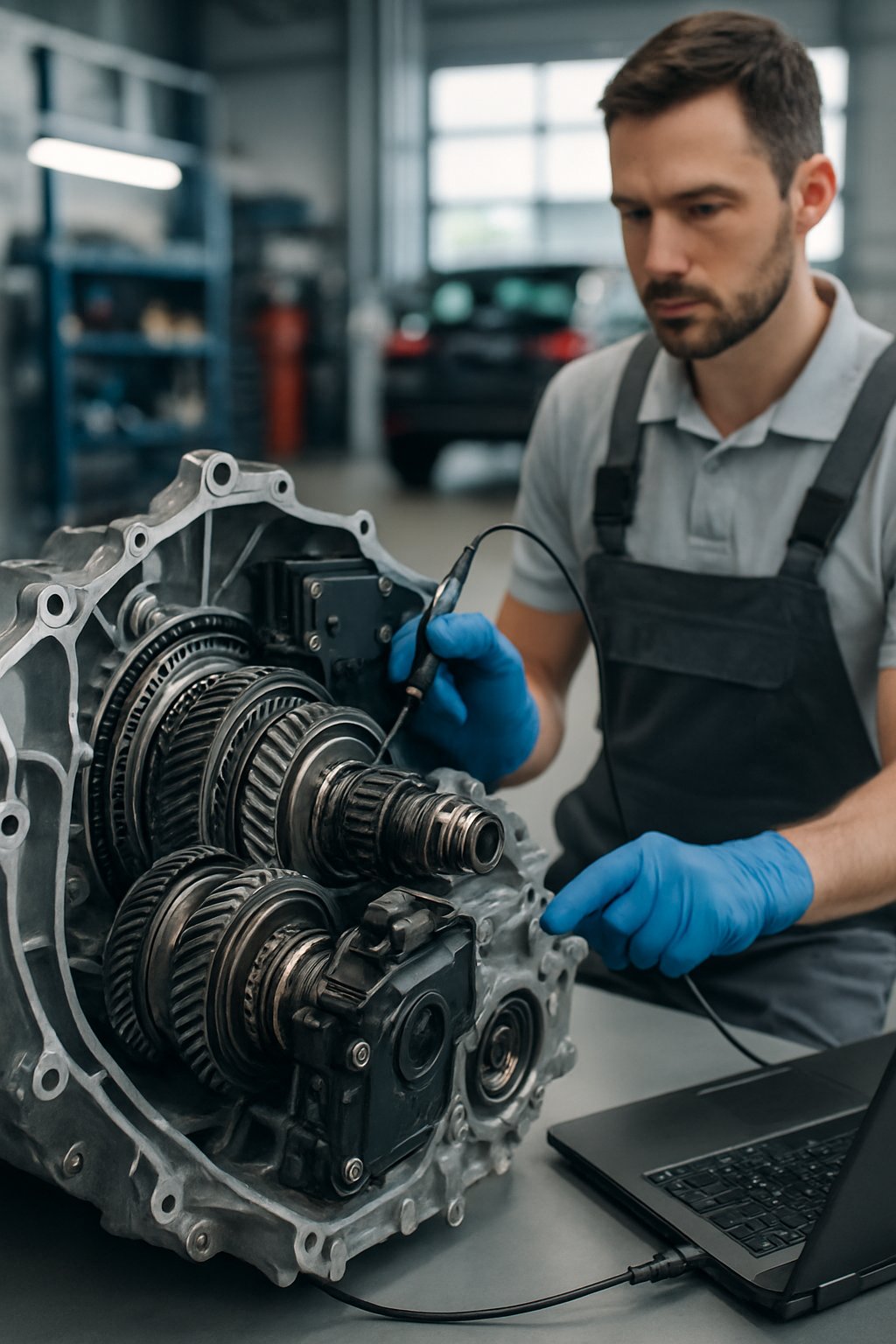
How DSG Gearboxes Work
The Direct Shift Gearbox operates using two separate clutches, each controlling a different set of gears—one for odd and one for even gears. This setup allows one gear to stay engaged while the next gear is already prepared. This means gear changes happen faster and smoother compared to standard transmissions. By merging the quickness of a manual gearbox with the ease of an automatic, the DSG system offers a balanced driving experience that suits both daily use and sportier driving styles.
Variations of DSG: Dry Clutch vs Wet Clutch Systems
There are two main types of DSG gearboxes, distinguished by their clutch designs:
| Clutch Type | Description | Typical Use | Pros | Cons |
|---|---|---|---|---|
| Dry Clutch | Uses clutches without oil | Smaller, less powerful cars | Simpler design, lighter | Can overheat under heavy use |
| Wet Clutch | Clutches are immersed in oil to reduce heat | More powerful or performance cars | Better cooling, more durable | Slightly heavier and more complex |
Choosing between dry or wet clutch DSG depends on the vehicle’s power and intended use, with wet clutches generally providing better durability for aggressive driving.
Differences Between DSG and Traditional Automatic Transmissions
Traditional automatic transmissions use a torque converter to handle gear changes, which can make shifts slower and less precise. In contrast, DSGs use a dual-clutch system, allowing gears to shift more quickly and with less power loss. The DSG system often predicts what gear the driver will need next and prepares it in advance. This reduces lag and improves responsiveness. While traditional automatics focus on smoothness, DSGs offer better control and a more connected feel for drivers who want a manual-style experience without clutch pedals.
Benefits of DSG for Performance and Fuel Economy
DSG gearboxes provide clear advantages in both car performance and fuel use. Their rapid shifting leads to quicker acceleration and smoother power delivery, which enhances driving enjoyment. At the same time, DSG systems help keep the engine running at efficient speeds by minimizing energy loss during gear changes. This precision results in improved fuel mileage compared to many traditional transmissions. Cars with DSGs, especially from Volkswagen Group brands like Audi and Seat, often balance sporty driving with practical fuel savings.
Key benefits:
- Faster gear shifts
- Improved acceleration
- Better fuel efficiency
- Smoother driving, especially with paddle shifters
- Combines manual control with automatic convenience
Common DSG Transmission Problems
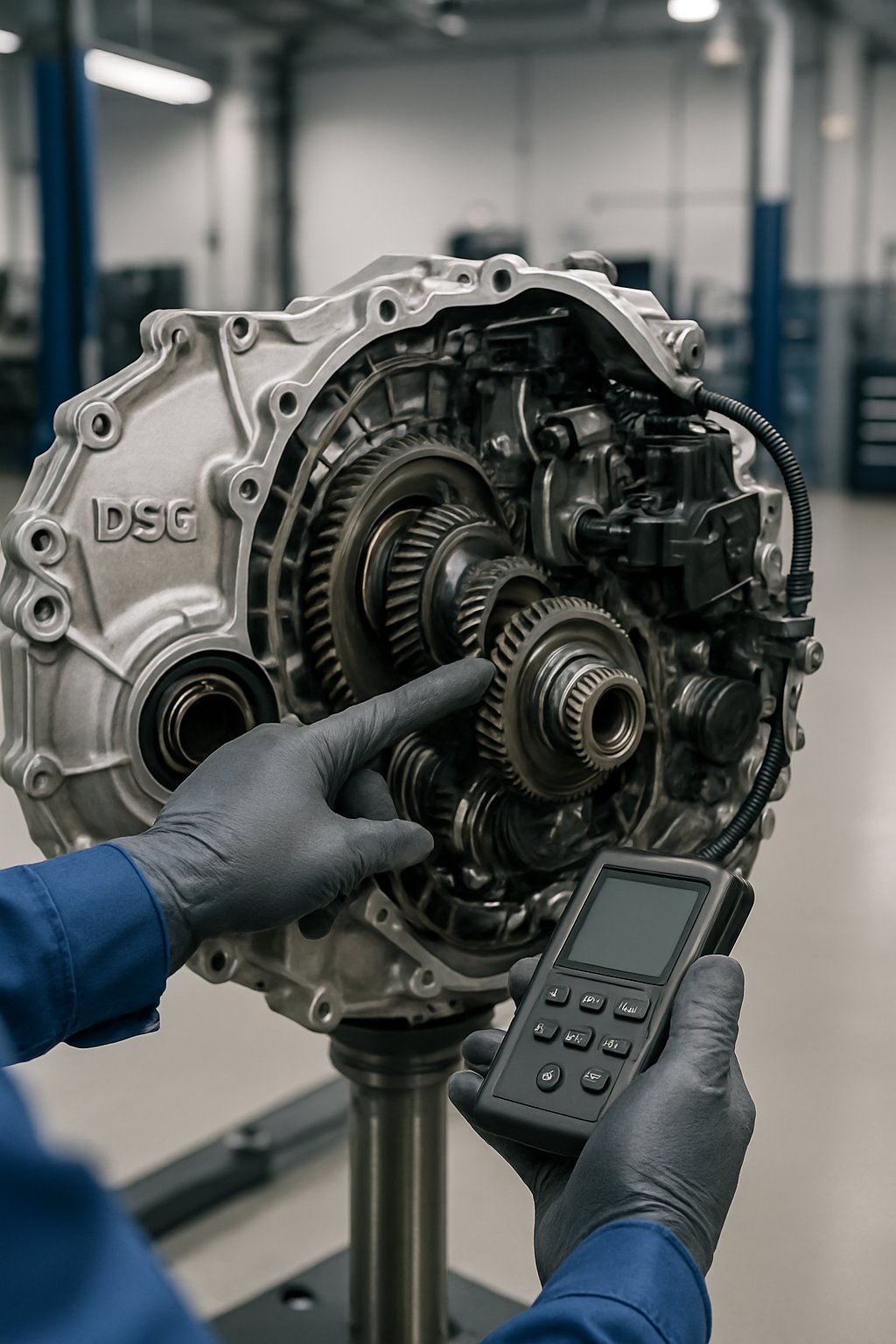
Failures in the Mechatronic Control Unit
The mechatronic unit controls how the DSG transmission shifts gears. When it malfunctions, drivers may see warning lights or experience uneven and unpredictable shifting. This component can develop software errors or hardware faults, both causing transmission issues. Sometimes resetting the software helps, but a damaged unit often needs full replacement. Routine checks can catch problems before they become severe.
Clutch Wear and Related Problems
DSG transmissions rely on two clutches working together, which can wear down with use. Worn clutches often cause gear hesitation, slipping gears, or trouble engaging gears smoothly. Drivers might hear strange noises or feel delays during shifting. Timely clutch inspection and replacement prevent costly repairs and extended vehicle downtime.
Noises from Bearing Wear
Bearings inside the transmission support rotating parts but can wear out over time. This wear can produce grinding or unusual noises when shifting gears. Older DSG models, especially those made before 2010, are more prone to bearing issues. Detecting these sounds early helps avoid bigger mechanical failures and extends gearbox life.
Issues with Solenoid Valves and Hydraulic Pressure
Solenoid valves manage hydraulic pressure needed for smooth gear changes. If they fail, hydraulic pressure drops, causing harsh or delayed shifting. This often triggers the transmission warning light. Diagnosing these problems needs specialized tools, and repairs may involve replacing solenoids or flushing the hydraulic system.
Sensor Malfunctions and Electrical Faults
Sensors send essential information to the transmission control module (TCM) to ensure proper shifting. Faulty sensors give incorrect data, causing shifting errors or triggering warning lights like the check engine light. Electrical glitches can also interfere with transmission operation. Diagnosing sensor problems requires scanning for error codes and verifying proper sensor connections to the control system.
| Problem Area | Common Symptoms | Possible Fixes |
|---|---|---|
| Mechatronic Unit | Erratic shifting, warning lights | Software reset, unit replacement |
| Clutch Wear | Gear slipping, hesitation, noise | Clutch inspection, replacement |
| Bearing Wear | Grinding sounds, noisy shifting | Bearing replacement, gearbox check |
| Solenoid Valve & Hydraulic | Harsh shifts, delayed engagement, warning light | Valve replacement, hydraulic flush |
| Sensor & Electrical Issues | Transmission error codes, warning lights | Sensor test, wiring inspection |
Troubleshooting and Repair Options
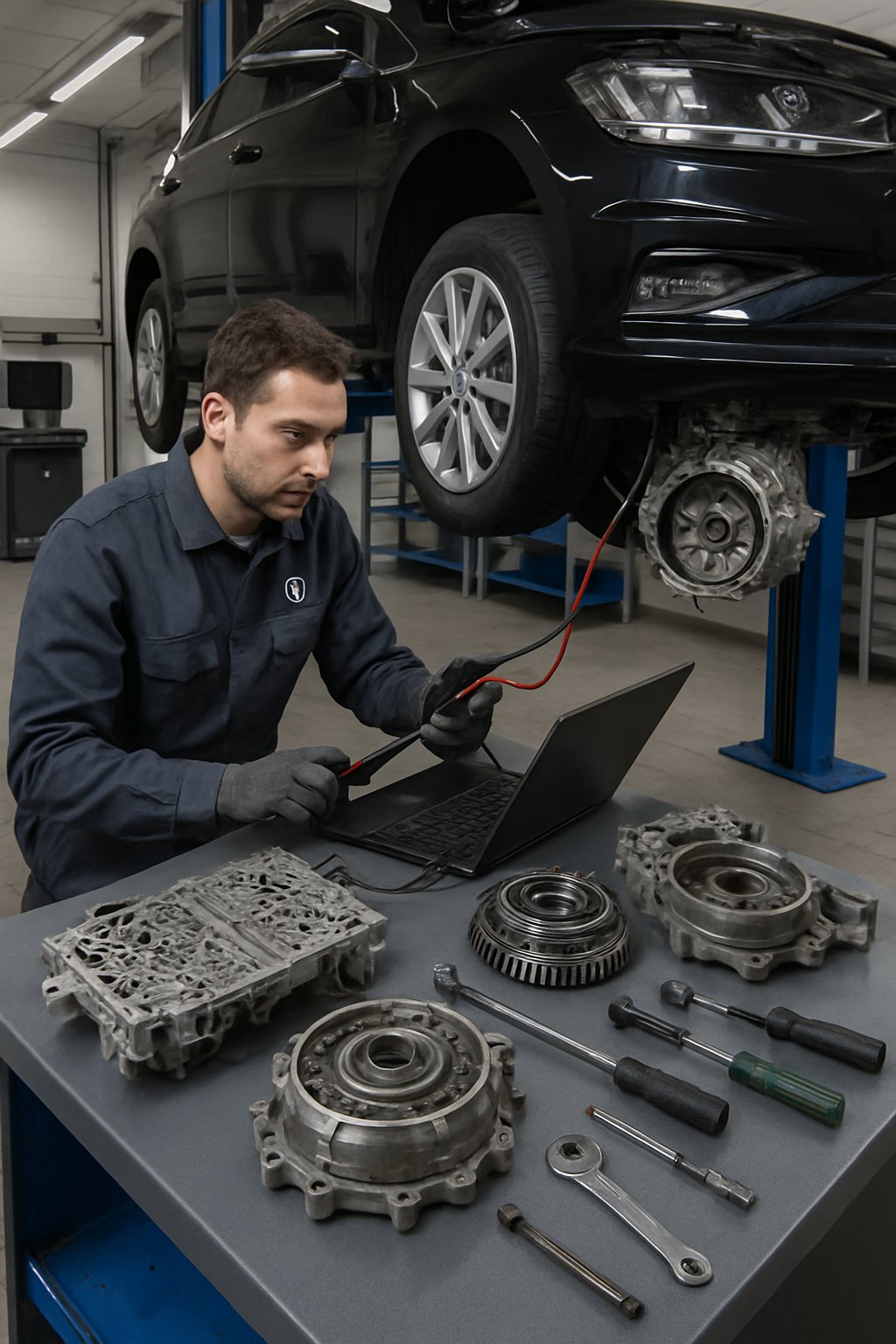
Basic Checks to Identify Problems
The first step is to check the transmission fluid level, as low fluid often causes shifting problems. Next, pay attention to any strange noises during gear changes, which could signal issues with parts like the mechatronics unit or clutch packs. Running a diagnostic scan can reveal error codes related to the Transmission Control Module (TCM).
It’s also important to examine the valve body and solenoid valves for wear or damage. These parts frequently cause shifting faults. If problems continue, assessing the gearbox condition might show a need for more serious repairs or potential transmission replacement.
When to Seek Expert Help
If simple checks don’t fix the issue, it’s best to visit a VW dealer or a certified specialist. Experts have the right tools and training to deal with complex components, especially the mechatronics unit. Persistent error codes, repeated slipping, or harsh shifting usually require professional diagnosis.
Major repairs, such as clutch pack replacements or transmission rebuilds, often need specialized knowledge. Regular small repairs that keep returning can also point to deeper problems, which professionals are better equipped to handle.
Comparing Professional Servicing and DIY Fixes
| Aspect | Professional Repairs | DIY Repairs |
|---|---|---|
| Benefits | Reliable, guaranteed quality; access to advanced tools and software | Saves money; suitable for simple tasks like fluid top-up or software reset |
| Drawbacks | May be expensive and take more time | Risk of mistakes; complex repairs can cause more damage |
People should consider how confident they feel and how difficult the problem is before deciding. For small tasks, DIY is possible, but if the repair involves mechatronics or transmission removal, expert help is usually safer and more dependable.
Maintenance and Prevention
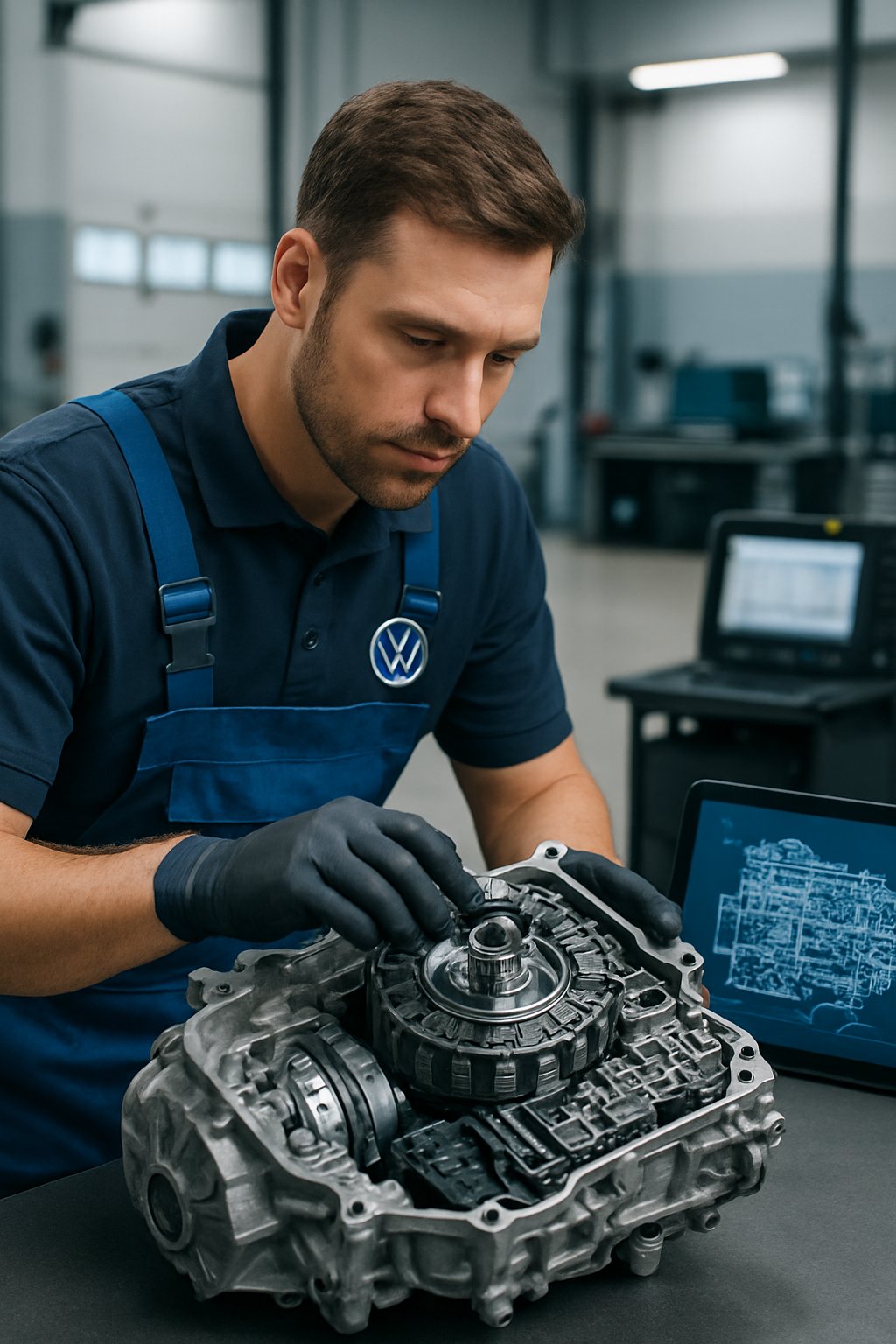
Scheduled Upkeep for DSG Transmissions
Keeping a DSG transmission running well depends on regular maintenance. Changing the transmission fluid and oil filter every 40,000 miles is important to ensure smooth gear shifts and proper clutch function. During these checks, technicians often inspect the dual-mass flywheel to catch early signs of wear. Sticking to the manufacturer’s recommended service intervals helps prevent costly damage and keeps the transmission working efficiently.
Tips to Maximize DSG Transmission Life
How a vehicle is driven makes a big difference in transmission health. Gradual acceleration and avoiding sudden speed changes reduce stress on the DSG system. Keeping the car’s software up-to-date ensures the transmission benefits from the latest performance improvements. It is also wise to avoid heavy towing or carrying excessive loads, as these put extra strain on transmission components. These simple steps help lower the risk of problems and maintain smooth operation.
Monitoring and Addressing Normal Wear
Wear and tear on a DSG transmission is unavoidable over time. Regular maintenance helps handle this natural process. Drivers should be alert to unusual sounds or changes in how the car drives, which could signal clutch or other internal issues. Tracking any changes in vehicle performance can highlight early signs of wear. Professional inspections are important to assess the condition and catch any serious wear before it leads to failure. Detecting problems early allows for timely repairs and better long-term results.
Ownership and Warranty Considerations
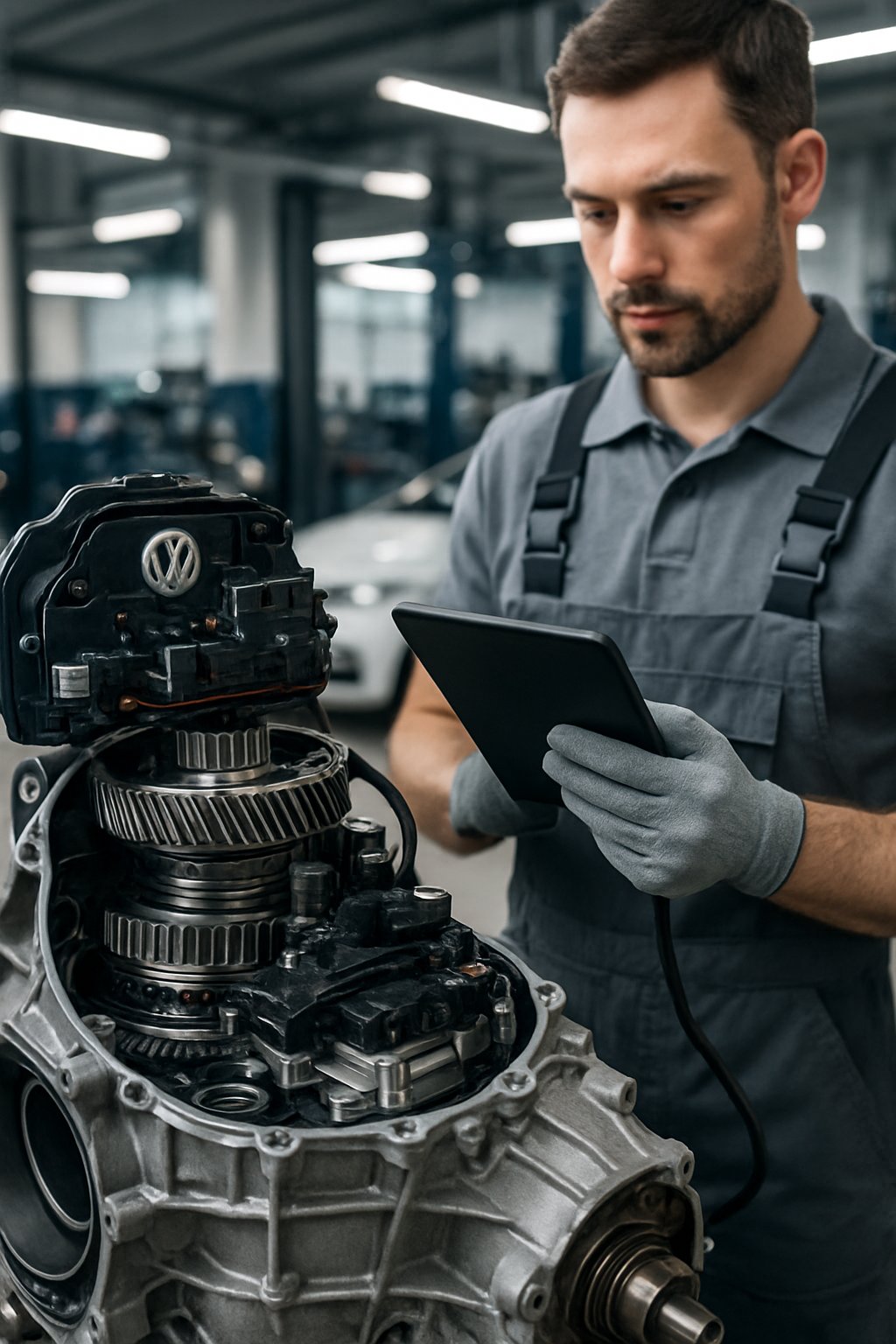
What the VW DSG Warranty Covers
Volkswagen provides a warranty that typically includes key parts of the DSG transmission for a limited time or distance driven. This usually covers major inner components like the clutch system and the mechatronics unit. It is important for owners to read the warranty terms carefully to understand exactly which parts are protected.
Maintaining accurate and up-to-date service records is essential. These documents support any warranty claim and help prove that proper maintenance has been performed. Without this proof, warranty coverage may be denied or limited.
Managing Service and Repairs Under Warranty
When repairs are needed, the first step should be to visit an authorized VW service center. Booking an appointment ahead of time is recommended since some repairs involve ordering special parts, which may take several days.
Owners should clearly communicate with the service department about what issues are covered under the warranty and what costs might fall outside of it. In some cases, parts or labor not included in the warranty will require payment from the owner. Knowing this in advance helps avoid surprise expenses.
Impact of DSG Transmission on Vehicle Value
The condition of the DSG transmission plays a significant role in the resale price of a Volkswagen. Potential buyers tend to closely inspect the gearbox’s performance and maintenance history before making a purchase.
Regular maintenance and keeping full service records can protect the car’s value and attract more buyers. This is especially true for VW models equipped with DSG, such as TDI versions, where a clean transmission history reassures buyers and reduces the chance of price cuts caused by concerns over transmission reliability.
| Tip for Owners | Reason |
|---|---|
| Keep all service receipts | Proves maintenance and supports warranty claims |
| Fix transmission issues early | Prevents bigger problems that hurt resale value |
| Use authorized service shops | Ensures proper repairs and preserves warranty |
Taking these steps helps owners maintain the car’s performance and market worth over time.
Frequently Asked Questions
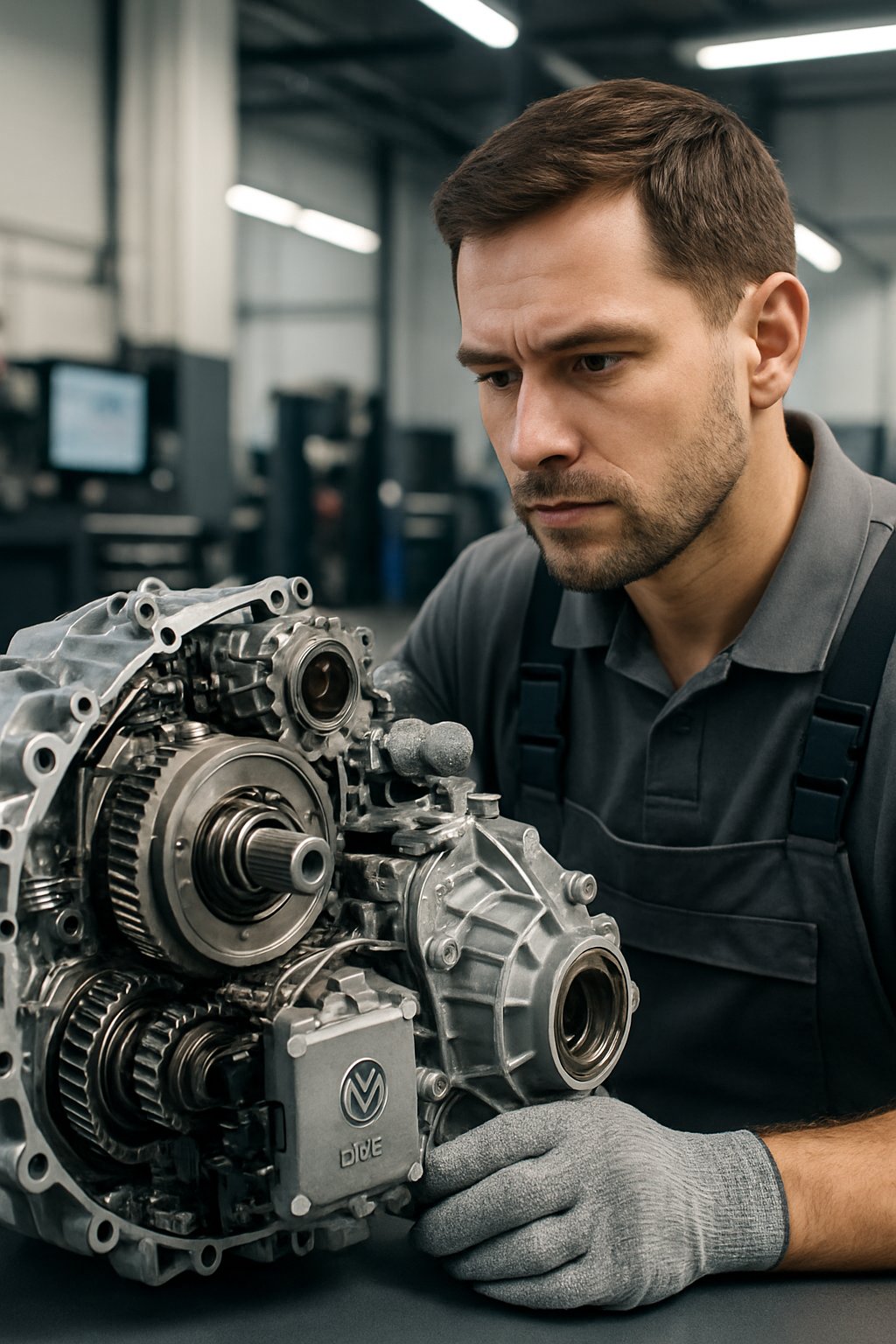
What problems frequently occur with 7-speed DSG transmissions?
The 7-speed DSG transmissions often face issues like clutch wear, which causes slipping or hesitation. Drivers may notice rough or jerky gear shifts and unexpected loss of power while driving. Electrical faults affecting sensors or solenoids can also cause the transmission to behave erratically or get stuck in a gear.
How can a VW owner tell if their car has DSG transmission problems?
Signs include unusual noises during shifting, hesitation or lag when accelerating, and the car slipping out of gear. Warning lights on the dashboard or error messages related to the transmission system may also appear. Maintenance history and recalls can help identify if a specific VW model is known to have DSG issues. Checking forums and official recall databases can provide further confirmation.
What are the signs that a 6-speed DSG gearbox might be failing?
A 6-speed DSG gearbox showing problems can produce symptoms such as jerky or delayed gear changes, abnormal vibrations or noises, and difficulty in engaging gears. The car may hesitate before accelerating or experience sudden power drops. These symptoms suggest clutch or hydraulic system wear and may require a diagnostic check.
What DSG gearbox problems have been reported in the VW Golf?
In the VW Golf, common issues include clutch pack wear leading to slipping, harsh or delayed shifts, and occasional complete failure of the transmission control unit. Some owners have reported problems with the dry-clutch system in certain Golf models that cause frequent repairs or premature part replacement.
Are there certain DSG gearbox types that should be avoided because of reliability?
Some DSG models with dry clutches, especially the 7-speed systems in smaller engines, have shown higher failure rates. The DQ200 is often mentioned as less reliable compared to the wet-clutch DQ250 version. Owners are advised to research specific transmission codes and model years to make informed decisions.
What is the usual cost range to fix DSG gearbox problems?
Repair costs vary widely depending on the issue. Minor fixes like sensor replacements or fluid changes can cost a few hundred dollars. Clutch pack repairs or full gearbox rebuilds may run from $1,000 to over $3,000. It’s important to get a diagnostic before proceeding, as some repairs can be costly.
For more details on issues and repairs, see VW DSG transmission problems explained.
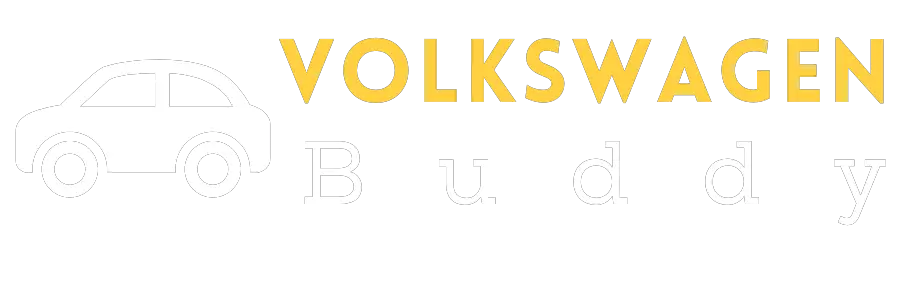




![2017 Volkswagen Passat Lights Wont Shut Off [Cause & Proven Fixes]](https://volkswagenbuddy.com/wp-content/uploads/2024/05/2017-volkswagen-passat-lights-wont-shut-off-cause-proven-fixes_4536-768x531.jpg)
